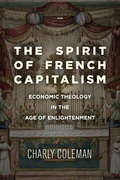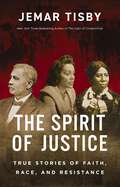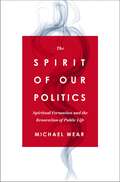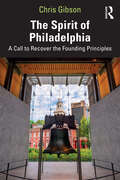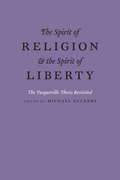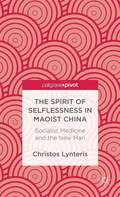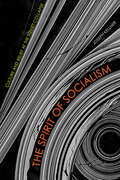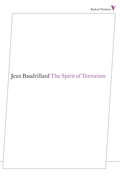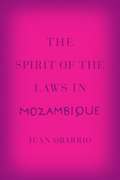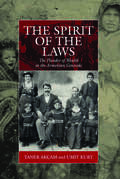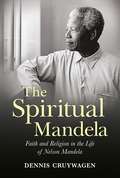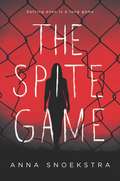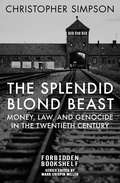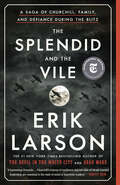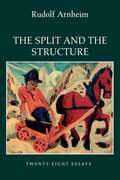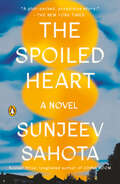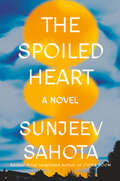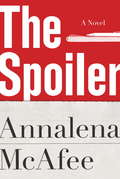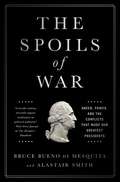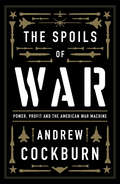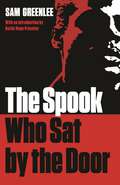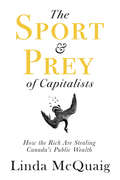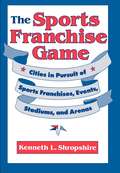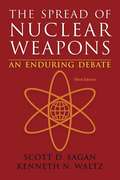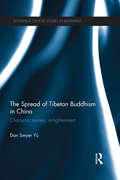- Table View
- List View
The Spirit of French Capitalism: Economic Theology in the Age of Enlightenment (Currencies: New Thinking for Financial Times)
by Charly ColemanHow did the economy become bound up with faith in infinite wealth creation and obsessive consumption? Drawing on the economic writings of eighteenth-century French theologians, historian Charly Coleman uncovers the surprising influence of the Catholic Church on the development of capitalism. Even during the Enlightenment, a sense of the miraculous did not wither under the cold light of calculation. Scarcity, long regarded as the inescapable fate of a fallen world, gradually gave way to a new belief in heavenly as well as worldly affluence. Animating this spiritual imperative of the French economy was a distinctly Catholic ethic that—in contrast to Weber's famous "Protestant ethic"—privileged the marvelous over the mundane, consumption over production, and the pleasures of enjoyment over the rigors of delayed gratification. By viewing money, luxury, and debt through the lens of sacramental theory, Coleman demonstrates that the modern economy casts far beyond rational action and disenchanted designs, and in ways that we have yet to apprehend fully.
The Spirit of Justice: True Stories of Faith, Race, and Resistance
by Jemar TisbyThe Black History You Never Knew: Uncovering Unsung Heroes in the Struggle for Racial Justice.The Spirit of Justice reveals the stories of the people who fought against racism and agitated for justice—and what we can learn from their example, their suffering, their methods, and their hope.How is it that people still work for change after continuously seeing the worst of humanity and experiencing the most demoralizing setbacks? What keeps them going? It is that spirit of justice that rises up "like a war horse," as Myrlie Evers-Williams famously said. It is a sense in the hearts of people who hunger and thirst for righteousness.In this book, award-winning author Jemar Tisby will open your eyes to the "pattern of endurance" in the centuries-long struggle for Black freedom in America. Through a historical survey of the nation from its founding to the present day, this book gives real-world examples of people who opposed racism, how they did it, what it cost, and what they gained for themselves and others.For those who were galvanized by Tisby's call to action in his acclaimed The Color of Compromise, this book will inspire you to see past the complicity of the church and gain the determination to join the fight for racial justice, no matter the cost.As Tisby writes, "The Spirit of justice is always at work to inspire followers of Christ to undertake acts of liberation and bear witness to the good news of their savior."
The Spirit of Our Politics: Spiritual Formation and the Renovation of Public Life
by Michael R. WearFor those discouraged and exhausted by the bitterness and rage in our politics, Michael Wear offers a new paradigm of political involvement rooted in the teachings of Jesus and drawing insights from Dallas Willard's approach to spiritual formation.When political division shows up not only on the campaign trail but also at our dinner tables, we wonder: Can we be part of a better way? The Spirit of Our Politics says "yes," offering a distinctly Christian approach to politics that results in healing rather than division, kindness rather than hatred, and hope rather than despair.In this profound and hope-filled book, Michael Wear--a leading thinker and practitioner at the intersection of faith and politics--applies insights taken from the work of Dallas Willard to argue that by focusing on having the "right" politics, we lose sight of the kind of people we are becoming, to destructive results. This paradigm-shifting book reveals:Why we need to reframe how we view our political involvement as ChristiansHow as Christians we can reorient our politics for the good of othersThe crucial connection between discipleship to Jesus and political involvementA different way of talking about politics that is edifying, not stomach-turningHow to navigate political strife in churches and small groupsWhy who we are in our political life is not quarantined from who we are in "real life"Why gentleness is entirely possible in our political discourse The Spirit of Our Politics is for readers of any political perspective who long for a new way to think about and engage in politics. That new approach begins with a simple question: What kind of person would I like to be?
The Spirit of Philadelphia: A Call to Recover the Founding Principles
by Chris GibsonThe Spirit of Philadelphia is America’s story told through the history of ideas and a cautionary tale of what happens when a nation’s Spirit goes dormant.This book proposes a return of the American government to the philosophical roots as articulated by the U.S. Constitution and its Framers. Grounded in realism, the Founders successfully balanced the needs and rights of the individual with those of the collective, creating a system that prioritized both personal liberty and societal order. Author and former Congressman Chris Gibson argues that abandoning the “Spirit of Philadelphia” (essentially the national spirit of cooperation, compromise, and teamwork) enabled dysfunction in government and disillusionment in the constituency. Culminating a comprehensive list of policy recommendations that logically analyze issues in the American political system, the author proposes an agenda aimed at restoring faith and functionality in national institutions and leaders, fostering bipartisan communication and collaboration, and revitalizing civic engagement at the individual level.Illustrating the changes in the political landscape of America since the Philadelphia convention, this book is an important read for students of democracy, political participation, elections, and voter behavior.
The Spirit of Religion and the Spirit of Liberty: The Tocqueville Thesis Revisited
by Michael ZuckertTocqueville’s thesis on the relation between religion and liberty could hardly be timelier. From events in the Middle East and the spread of Islamist violence in the name of religion to the mandated coverage under the Affordable Care Act, the interaction between religion and politics has once again become central to political life. Tocqueville, facing the coming of a new social and political order within the traditional society that was France, faced this relation between politics and religion with freshness and relevance. He was particularly interested in reporting to his French compatriots on how the Americans had successfully resolved what, to many Frenchmen, looked to be an insuperable conflict. His surprising thesis was that the right kind of arrangement—a certain kind of separation of church and state that was not also a complete separation of religion and politics—could be seen in nineteenth century America to be beneficial to both liberty and religion. This volume investigates whether Tocqueville’s depiction was valid for the America he investigated in the 1830s and whether it remains valid today.
The Spirit of Selflessness in Maoist China
by Christos LynterisAssuming power in 1949, the Chinese Communist Party was soon faced with a crucial problem: how to construct the socialist 'New Man'? Using Foucault's theory of 'technologies of the self', Lynteris examines the conflict between self-cultivation and the abolition of the self in the biopolitically neuralgic field of 'socialist medicine'.
The Spirit of Socialism: Culture and Belief at the Soviet Collapse
by Joseph KellnerThe Spirit of Socialism is a cultural history of the Soviet collapse. It examines the millions of Soviet people who, during the cascading crises of the collapse and the post-Soviet transition, embarked on a spirited and highly visible search for new meaning. Amid profound disorientation, these seekers found direction in their horoscopes, or behind gurus in saffron robes or apocalyptic preachers, or by turning from the most basic premises of official science and history to orient themselves anew. The beliefs they seized on and, even more, the questions that guided their search reveal the essence of late-Soviet culture and its legacy in post-Soviet Russia.To skeptical outsiders, the seekers appeared eccentric, deviant, and above all un-Soviet. Yet they came to their ideas by Soviet sources and Soviet premises. As Joseph Kellner demonstrates, their motley beliefs reflect modern values that formed the spiritual core of Soviet ideology, among them a high regard for science, an informed and generous internationalism, and a confidence in humanity to chart its own course. Soviet ideology failed, however, to unite these values in an overarching vision that could withstand historical change.And so, as The Spirit of Socialism shows, the seekers asked questions raised but not resolved by the Russian Revolution and subsequent Soviet order—questions of epistemic authority, of cultural identity, and of history's ultimate meaning. Although the Soviet collapse was not the end of history, it was a rupture of epochal significance, whose fissures extend into our own uncertain era.
The Spirit of Terrorism
by Jean Baudrillard Chris TurnerBaudrillard sees the power of the terrorists as lying in the symbolism of slaughter--not merely the reality of death, but in a sacrifice that challenges the whole system. Where previously the old revolutionary sought to conduct a struggle between real forces in the context of ideology and politics, the new terrorist mounts a powerful symbolic challenge which, when combined with high-tech resources, constitutes an unprecedented assault on an over-sophisticated and vulnerable West. This new edition is up-dated with the essays "Hypotheses on Terrorism" and "Violence of the Global."From the Trade Paperback edition.
The Spirit of the Laws in Mozambique
by Juan ObarrioMozambique has been hailed as a success story by the international community, which has watched it evolve through a series of violent political upheavals: from colonialism, through socialism, to its current democracy. As Juan Obarrio shows, however, this view neglects a crucial element in Mozambique's transition to the rule of law: the reestablishment of traditional chieftanship and customs entangled within a history of colonial violence and civil war. Drawing on extensive historical records and ethnographic fieldwork, he examines the role of customary law in Mozambique to ask a larger question: what is the place of law in the neoliberal era, in which the juridical and the economic are deeply intertwined in an ongoing state of structural adjustment?
The Spirit of the Laws: The Plunder of Wealth in the Armenian Genocide
by Taner Akçam Umit KurtPertinent to contemporary demands for reparations from Turkey is the relationship between law and property in connection with the Armenian Genocide. This book examines the confiscation of Armenian properties during the genocide and subsequent attempts to retain seized Armenian wealth. Through the close analysis of laws and treaties, it reveals that decrees issued during the genocide constitute central pillars of the Turkish system of property rights, retaining their legal validity, and although Turkey has acceded through international agreements to return Armenian properties, it continues to refuse to do so. The book demonstrates that genocides do not depend on the abolition of the legal system and elimination of rights, but that, on the contrary, the perpetrators of genocide manipulate the legal system to facilitate their plans.
The Spiritual Mandela: Faith and Religion in the Life of Nelson Mandela
by Dennis CruywagenIn the first book of its kind, an acclaimed South African journalist and former parliamentary spokesperson for the ANC shares how Nelson Mandela balanced his Christian faith with his political views, exploring how the beloved leader reconciled his own beliefs with the hard truth that religion had often been used as a tool to oppress his people. ♦ "Insightful. . . a nuanced understanding of how faith influenced the renowned civil rights activist." — Publishers Weekly, starred review ". . .illuminating and an essential addition to studies of Mandela's life and work." —Booklist Nelson Mandela revealed nothing about his personal religious beliefs in his writings or in his public pronouncements. But those who were close to him know that he held Christian views. At his request, the final components of his funeral followed the Methodist service. Acclaimed journalist Dennis Cruywagen traces the spiritual component of Mandela's life, from his youth in a traditional Thembu village to his education at Wesleyan and Methodist mission schools to his time as an activist to his period on Robben Island and the years thereafter. Based on interviews with some of Mandela's close colleagues, such as Ahmed Kathrada, as well as priests and other religious figures with whom he interacted, this book unearths an unknown dimension of one of recent history's most respected men.
The Spite Game
by Anna SnoekstraEveryone does bad things when no one is watchingMercilessly bullied in high school, Ava knows she needs to put the past behind her and move on, but she can’t—not until she’s exacted precise, catastrophic revenge on the people who hurt her the most.First, she watches Saanvi. Flawlessly chic and working hard at a top architectural firm, Saanvi has it all together on the surface. But everyone does bad things when they think no one is watching and Ava only wants what’s fair—to destroy Saanvi’s life the way her own was destroyed.Next, she watches Cass. She’s there as Cass tries on wedding dresses, she’s there when Cass picks out a cake, she’s there when Cass betrays her fiancé. She’s the reason Cass’s entire future comes crashing down. Finally, Ava watches Mel. Mel was always the ringleader and if anyone has to pay, it’s her. But one tiny slipup and Ava realizes the truth: Mel knows she’s being watched, and she’s ready to play Ava’s games to the bitter end.
The Splendid Blond Beast: Money, Law, and Genocide in the Twentieth Century (Forbidden Bookshelf #24)
by Christopher SimpsonFrom a National Jewish Book Award–winning author: The &“revelatory and shocking&” investigation into the CIA&’s liberation of Nazi war criminals (Kirkus Reviews). How did Gen, Karl Wolff, one of the highest-ranking members of the Nazi Party&’s Waffen-SS, who personally oversaw the deportation of three hundred thousand Jews to the Treblinka extermination camps, escape prosecution at the Nuremberg trials? As revealed in this groundbreaking investigation—culled from recently uncovered archival documents—the answer lies within the US government, which buried reports on the Final Solution and was complicit in the recruitment of Nazi war criminals, all to protect the world economy. Among the key players was CIA director Allen Dulles, who was not only instrumental in Wolff&’s exoneration but also responsible for installing former slave-labor specialists into positions of power in postwar Germany. In this damning exposé of American government malfeasance, author Christopher Simpson traces the roots of mass murder as an instrument of financial gain and state power, from the Armenian genocide during World War I to Hitler&’s Holocaust through the practice of genocide today. Detailing how the existing structures of international law and commerce have encouraged mass killings, corporate looting, and profiteering at the expense of innocent victims, The Splendid Blond Beast is a disturbing and profound book about the success of evil in our time. The award-winning author of Blowback and Science of Coercion, Simpson also served as research director for Marcel Ophüls&’s Oscar-winning documentary, Hôtel Terminus: The Life and Times of Klaus Barbie.
The Splendid and the Vile: A Saga of Churchill, Family, and Defiance During the Blitz
by Erik Larson#1 NEW YORK TIMES BESTSELLER • The author of The Devil in the White City and Dead Wake delivers an intimate chronicle of Winston Churchill and London during the Blitz—an inspiring portrait of courage and leadership in a time of unprecedented crisis &“One of [Erik Larson&’s] best books yet . . . perfectly timed for the moment.&”—Time • &“A bravura performance by one of America&’s greatest storytellers.&”—NPR NAMED ONE OF THE BEST BOOKS OF THE YEAR BY The New York Times Book Review • Time • Vogue • NPR • The Washington Post • Chicago Tribune • The Globe & Mail • Fortune • Bloomberg • New York Post • The New York Public Library • Kirkus Reviews • LibraryReads • PopMattersOn Winston Churchill&’s first day as prime minister, Adolf Hitler invaded Holland and Belgium. Poland and Czechoslovakia had already fallen, and the Dunkirk evacuation was just two weeks away. For the next twelve months, Hitler would wage a relentless bombing campaign, killing 45,000 Britons. It was up to Churchill to hold his country together and persuade President Franklin Roosevelt that Britain was a worthy ally—and willing to fight to the end. In The Splendid and the Vile, Erik Larson shows, in cinematic detail, how Churchill taught the British people &“the art of being fearless.&” It is a story of political brinkmanship, but it&’s also an intimate domestic drama, set against the backdrop of Churchill&’s prime-ministerial country home, Chequers; his wartime retreat, Ditchley, where he and his entourage go when the moon is brightest and the bombing threat is highest; and of course 10 Downing Street in London. Drawing on diaries, original archival documents, and once-secret intelligence reports—some released only recently—Larson provides a new lens on London&’s darkest year through the day-to-day experience of Churchill and his family: his wife, Clementine; their youngest daughter, Mary, who chafes against her parents&’ wartime protectiveness; their son, Randolph, and his beautiful, unhappy wife, Pamela; Pamela&’s illicit lover, a dashing American emissary; and the advisers in Churchill&’s &“Secret Circle,&” to whom he turns in the hardest moments. The Splendid and the Vile takes readers out of today&’s political dysfunction and back to a time of true leadership, when, in the face of unrelenting horror, Churchill&’s eloquence, courage, and perseverance bound a country, and a family, together.
The Split and the Structure: Twenty-Eight Essays
by Rudolf ArnheimRudolf Arnheim's great forte is his ability to illuminate the perceptual processes that go into the making and reception of artworks—painting, sculpture, architecture, and film. Over the years, his pioneering mode of "reading" art from a unique scientific/philosophic perspective has garnered him an established and devoted audience. That audience will take pleasure in Arnheim's most recent collection of essays, one that covers a range of topics and includes titles such as "Outer Space and Inner Space," "What Is an Aesthetic Fact?," "As I Saw Children's Art," "Two Ways of Being Human," "Consciousness—an Island of Images," and "From Chaos to Wholeness."The notion of structure is Arnheim's guide in these explorations. Most of the essays examine the nature of structure affirmatively: how it comes about, its incentives and objectives, its celebration of perfection. He is interested in how artists grope for structure to shape powerful, enlightening images, and how a scientist's search for truth is a search for structure.Writing with enviable clarity, even when deploying complex arguments, Arnheim makes it easy and exciting to follow him as he thinks. America is not abundantly supplied with "public intellectuals" such as Rudolf Arnheim—to have his writings with us is cause for celebration. "The word 'structure' appears for good reason in the title of this collection. . . . Structure seems to be needed as an arbiter wherever this civilization of ours is split by selfish interests and fighting for either/or decisions. The essays want to speak with the voice of reason, because they want to show how the parts require the whole."
The Spoiled Heart: A Novel
by Sunjeev Sahota&“The Spoiled Heart confirms Sunjeev Sahota's position as one of our essential novelists.&” —Karan Mahajan, author of the National Book Award Finalist The Association of Small BombsA brilliant and riveting story of ambition, love, family secrets, and unintended consequences, from &“bold storyteller&” (The New Yorker) and two-time Booker Prize nominee Sunjeev SahotaNayan Olak keeps seeing Helen Fletcher around town. She&’s returned with her teenage son to live in the run-down house at the end of the lane, and—though she&’s strangely guarded—Nayan can&’t help but be drawn to her. He hasn&’t risked love since losing his young family in a terrible accident twenty years earlier.In the wake of the tragedy, Nayan&’s labor union, long a cornerstone of his community, became the center of his life: a way for him to channel his energies into making the world a better—fairer, as he sees it—place. Now, he&’s decided to mount a run for the leadership. But his campaign pits him against a newcomer, Megha, who quickly proves to be a more formidable challenger than he anticipated.As Nayan&’s differences with Megha spin out of control, complicating the ideals he&’s always held dear, he grows closer to Helen—and unknowingly barrels toward long-held secrets about how their pasts might be connected. Suddenly, much more is threatened than his chances of winning.In one sense a tragedy in the classic mold, tracing one man&’s seemingly inexorable fall, The Spoiled Heart is also an explosively contemporary story of how a few words or a single action—to one person careless, to another, charged—can trigger a cascade of unimaginable consequences. A vivid and multi-layered exploration of the mysteries of the heart, how community is forged and broken, and the shattering impact of secrets and assumptions alike, it is a blazing achievement from one of Britain&’s foremost living writers.
The Spoiled Heart: A novel
by Sunjeev Sahota&“The Spoiled Heart confirms Sunjeev Sahota's position as one of our essential novelists.&” —Karan Mahajan, author of the National Book Award Finalist The Association of Small Bombs A brilliant and riveting story of ambition, love, family secrets, and unintended consequences, from &“bold storyteller&” (The New Yorker) and two-time Booker Prize nominee Sunjeev SahotaNayan Olak keeps seeing Helen Fletcher around town. She&’s returned with her teenage son to live in the run-down house at the end of the lane, and—though she&’s strangely guarded—Nayan can&’t help but be drawn to her. He hasn&’t risked love since losing his young family in a terrible accident twenty years earlier.In the wake of the tragedy, Nayan&’s labor union, long a cornerstone of his community, became the center of his life: a way for him to channel his energies into making the world a better—fairer, as he sees it—place. Now, he&’s decided to mount a run for the leadership. But his campaign pits him against a newcomer, Megha, who quickly proves to be a more formidable challenger than he anticipated.As Nayan&’s differences with Megha spin out of control, complicating the ideals he&’s always held dear, he grows closer to Helen—and unknowingly barrels toward long-held secrets about how their pasts might be connected. Suddenly, much more is threatened than his chances of winning.In one sense a tragedy in the classic mold, tracing one man&’s seemingly inexorable fall, The Spoiled Heart is also an explosively contemporary story of how a few words or a single action—to one person careless, to another, charged—can trigger a cascade of unimaginable consequences. A vivid and multi-layered exploration of the mysteries of the heart, how community is forged and broken, and the shattering impact of secrets and assumptions alike, it is a blazing achievement from one of Britain&’s foremost living writers.
The Spoiler
by Annalena McafeeA dark hyper-comedy set in London in the late 1990s during the last gasp of the newspaper wars just before the dot-com tidal wave--about two female journalists at opposite ends of their life and work who become locked in a fierce tango of wills and whose lives are forever changed by their (not-so-) brief (head-on) encounter.At the novel's center--a legendary prize-winning war correspondent (called in her day "The Newsroom Dietrich" because of her luminescent beauty) now in her eighties, at the end of her career, who, over the decades, as the intrepid golden girl of the press, has been on the front lines or in the foxholes of every major theater of war of the twentieth century (Madrid; Normandy; Buchenwald; Berlin; Algiers; Korea; Vietnam). She is recognized everywhere (she finds fame mortifying these days); lionized for her fearless, politically informed, objective reporting; and now, though fragile and in an accelerating decline, her goddess-like beauty long gone, her style of writing--unbiased reportage--obsolete in the age of New Journalism, is rediscovered with the reissue of her frontline journalism, and the about-to-be-published collection of her Pulitzer Prize-winning dispatches. The other, a young up-and-not-so-coming reporter in her twenties; a degree in media studies, a freelance editor who compiles A-lists (Ten Best / Ten Worst; What's In / What's Out) for a down-market magazine of a newspaper specializing in celebrity gossip, unexpectedly sent to write a feature on the venerated "doyenne of British journalists"--to get the dirt on her glittering Hollywood days, her many affairs and three marriages...What ensues is a high-stakes, high-risk battle of wit and wills as lives are shaken, secrets unearthed, and headlines blast (unconfirmed) "truths," with one newspaper--the spoiler--playing off against another in a ruthless, desperate grab for sensation and circulation.
The Spoils of War: Greed, Power, and the Conflicts That Made Our Greatest Presidents
by Bruce Bueno de Mesquita Alastair SmithWhy are America's most beloved presidents also our most dangerous?It's striking how many of the presidents Americans venerate-Abraham Lincoln, George Washington, Franklin D. Roosevelt, and John F. Kennedy, to name a few-oversaw some of the republic's bloodiest years. Perhaps they were driven by the needs of the American people and the nation. Or maybe they were just looking out for themselves.This revealing and entertaining book puts some of America's greatest leaders under the microscope, showing how their calls for war, usually remembered as brave and noble, were in fact selfish and convenient. In each case, our presidents chose personal gain over national interest while loudly evoking justice and freedom. The result is an eye-opening retelling of American history, and a call for reforms that may make the future better.Bueno de Mesquita and Smith demonstrate in compelling fashion that wars, even bloody and noble ones, are not primarily motivated by democracy or freedom or the sanctity of human life. When our presidents risk the lives of brave young soldiers, they do it for themselves.
The Spoils of War: Power, Profit and the American War Machine
by Andrew CockburnWhy Does America Go to War?In the last decades, America has gone to war as supposed defenders of democracy. The War on Terror was waged to protect the west from the dangers of Islamists. US Solders are stationed in over 800 locations across the world to act as the righteous arbiters of the rule of law. In What The Spoils of War Andrew Cockburn brilliantly dissects the intentions behind Washington's martial appetites.The American war machine can only be understood in terms of the "private passions" and "interests" of those who control it - principally a passionate interest in money. Thus, as he witheringly reports, Washington expanded NATO to satisfy an arms manufacturer's urgent financial requirements; the U.S. Navy's Pacific fleet deployments were for years dictated by a corrupt contractor who bribed high-ranking officers with cash and prostitutes; senior marine commanders agreed to a troop surge in Afghanistan in 2017 "because it will do us good at budget time."Based on years of wide-ranging research, Cockburn lays bare the ugly reality of the largest military machine in history: squalid, and at the same time terrifyingly dangerous.
The Spook Who Sat by the Door, Second Edition (African American Life Series)
by Sam GreenleeA classic in the black literary tradition, The Spook Who Sat by the Door is both a comment on the civil rights problems in the United States in the late 1960s and a serious attempt to focus on the issue of black militancy. Dan Freeman, the "spook who sat by the door," is enlisted in the CIA's elitist espionage program. Upon mastering agency tactics, however, he drops out to train young Chicago blacks as "Freedom Fighters" in this explosive, award-winning novel. As a story of one man's reaction to ruling-class hypocrisy, the book is autobiographical and personal. As a tale of a man's reaction to oppression, it is universal.
The Sport and Prey of Capitalists: How the Rich Are Stealing Canada’s Public Wealth
by Linda McQuaigWhy are we selling off the impressive public enterprises we often battled as a nation to create? In the early 1900s, thousands of Canadians battled wealthy interests, winning control of Niagara Falls and creating a public power company. Another popular movement succeeded in creating Canada’s public broadcasting system to counter American dominance of the airwaves. And a Canadian doctor established a publicly owned laboratory that saved countless lives by producing affordable medications, contributing to medical breakthroughs and helping to eradicate smallpox throughout the world. But in recent decades, we have allowed our inspiring public enterprises to be privatized and our vital public programs downsized, leaving us increasingly dominated by the forces of private greed that rule the marketplace. In The Sport and Prey of Capitalists, Linda McQuaig challenges the dogma of privatization, which has defined our political era. She argues that now more than ever, as we grapple with climate change and income inequality, we need to expand, not shrink, our public sphere.
The Sports Franchise Game
by Kenneth L. ShropshirePower, prestige, and millions of dollars--these are the stakes in the sports franchise game. In this book, sports attorney Kenneth Shropshire describes the franchise warfare that pits city against city in the fierce bidding competition to capture major league teams. Rigorous research, fascinating interviews with major players, stories behind the headlines, and an insider's perspective converge in this rare view of the business side of professional sports. Shropshire portrays a complex web of motivations, negotiations, and public relations, and discusses examples from Philadelphia, the Bay Area, and Washington D.C.
The Spread Of Nuclear Weapons: An Enduring Debate (Third Edition)
by Kenneth N. Waltz Scott Douglas SaganOver the past fifteen years, The Spread of Nuclear Weapons has been a staple in International Relations courses because of its brevity and crystal-clear explanations. The new edition, An Enduring Debate, continues the important discussion of nuclear proliferation and the dangers of a nuclear-armed world. With new chapters on the questions surrounding a nuclear North Korea, Iran, and Iraq and the potential for a world free of nuclear weapons, this Third Edition will continue to generate a lively classroom experience.
The Spread of Tibetan Buddhism in China: Charisma, Money, Enlightenment (Routledge Critical Studies in Buddhism)
by Dan Smyer YuFocusing on contemporary Tibetan Buddhist revivals in the Tibetan regions of the Sichuan and Qinghai Provinces in China, this book explores the intricate entanglements of the Buddhist revivals with cultural identity, state ideology, and popular imagination of Tibetan Buddhist spirituality in contemporary China. In turn, the author explores the broader socio-cultural implications of such revivals. Based on detailed cross-regional ethnographic work, the book demonstrates that the revival of Tibetan Buddhism in contemporary China is intimately bound with both the affirming and negating forces of globalization, modernity, and politics of religion, indigenous identity reclamation, and the market economy. The analysis highlights the multidimensionality of Tibetan Buddhism in relation to different religious, cultural, and political constituencies of China. By recognizing the greater contexts of China’s politics of religion and of the global status of Tibetan Buddhism, this book presents an argument that the revival of Tibetan Buddhism is not an isolated event limited merely to Tibetan regions; instead, it is a result of the intersection of both local and global transformative changes. The book is a useful contribution to students and scholars of Asian religion and Chinese studies.
